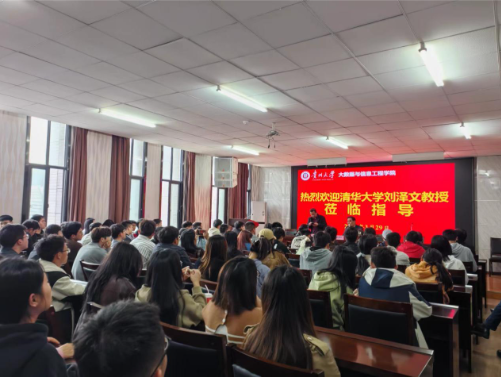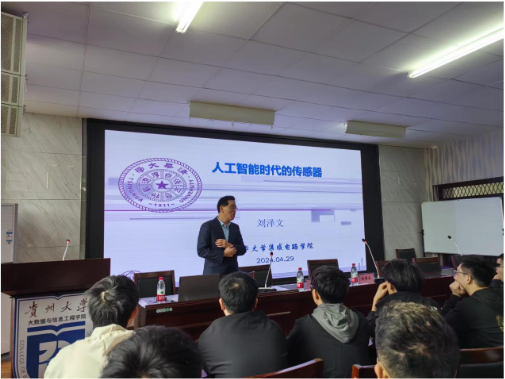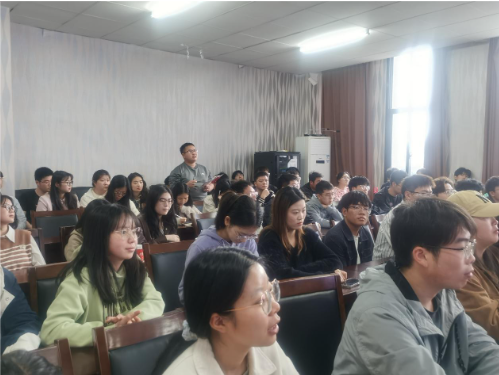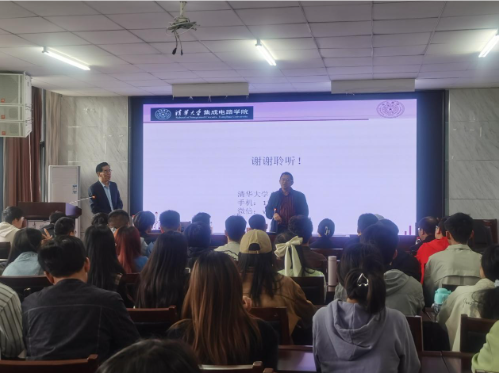

To actively explore the boundless possibilities of the era of artificial intelligence, gain an understanding of the new horizons and landscapes of sensors in the age of AI, invigorate the academic atmosphere in the college, promote academic exchanges, broaden the horizons of teachers and students, advance quality education, and enhance the college's research level, on the morning of March 29th, the Big Data and Information Engineering College of Guizhou University (hereinafter referred to as our college) invited Professor Liu Zewen from the School of Integrated Circuits, Tsinghua University, to deliver an academic report titled Sensors in the Age of Artificial Intelligence in the 509 conference room of Chongli Building. Professor Wu Cinan, the former vice president of Guizhou University, Chen Yong, the party secretary of the college, Ding Zhao and Gao Tinghong, the deputy heads of the college, representatives of teachers, and representatives of graduate students, totaling over 120 people, attended the report, which was hosted by Professor Xie Quan.

Before the lecture, Professor Xie Quan introduced the basic information, scientific research achievements, academic attainments, and academic influence of the invited guest, Professor Liu Zewen. He also hoped that the teachers and students would cherish this valuable opportunity, listen attentively, think actively, broaden their horizons, work hard, and improve their academic research capabilities and levels.

In the report, Professor Liu Zewen focused on the topic of Sensors in the Age of Artificial Intelligence and provided vivid explanations around three aspects: gallium nitride sensors for MEMS, RFMEMS and radar sensors, and nanopore and gene sensors. He emphasized that sensors are an important part of information technology systems, key components of advanced manufacturing and intelligent equipment, reliable data sources for big data in the data era, and essential foundations for urban IoT and data energy centers. They possess vast market space and academic and technological development prospects.

During the report, teachers and students from our college had exciting interactions with Professor Liu Zewen, creating a lively atmosphere. Teachers and students actively engaged in discussions with Professor Liu on broader research areas and directions in the era of AI, as well as related development prospects. Professor Liu responded to their questions with easy-to-understand, lively, and in-depth answers.

After the report, Professor Xie Quan summarized and pointed out that Professor Liu Zewen has made outstanding achievements in academic research, publishing over 200 high-level papers and over 80 invention patents. He is a pioneer in radio frequency MEMS technology, silicon-based nanopore technology, and gallium nitride sensors. He hopes that the teachers and students present can actively learn from and inherit Professor Liu's scientist spirit of treating science with a scientific attitude and pursuing truth with a true spirit, study hard, conduct rigorous research, strive to improve their personal qualities and academic research capabilities, and continuously enhance their abilities to contribute to the socialist modernization of the motherland. Finally, with the warm applause of all teachers and students, the academic report successfully concluded.
